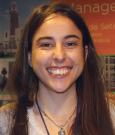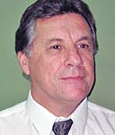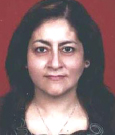Multidisciplinary Cancer Management Courses (MCMCs) offered by ASCO International, in collaboration with other organizations, seek to improve cancer care globally through the promotion of interdisciplinary cancer management.
Attendees of select MCMCs have the option to attend a 1- to 2-day training workshop called Train the Trainer (TTT). During this workshop, attendees can increase their understanding of multidisciplinary cancer care concepts, learn effective teaching methods and practical skills, and discuss implementation strategies for their own trainings with their communities and institutions. Those who have completed the training are encouraged to disseminate what they have learned by organizing their own courses.
ASCO International asked past participants from Chile, Uruguay, Paraguay, and Bolivia to share their TTT workshop experience.
Chile: Christian Caglevic, MD
“In 2006, the first MCMC was held in Chile thanks to the efforts of ASCO and numerous Chilean oncologists, especially Jorge Gallardo, MD, a medical oncologist who in 2010 also brought the new TTT program to Chile.
“This was my first time participating in an ASCO activity outside the United States. I didn’t really know what TTT was and what it would mean for me in my professional career years later. I did know, though, that TTT’s purpose was to teach us about how to lead presentations, speak in front of other colleagues, and feel confident when giving a speech. The ASCO delegates leading the course (Hugo V. Villar, MD, FACS; Frank D. Ferries, MD; and Vanessa Eaton, ASCO Manager of International Education) taught us some techniques that we practiced during TTT, including speaking in front of an audience, role-playing different situations, and observing and commenting on the performance of our colleagues.
“My major hope for this course was to be able to stand alone in front of an audience and share something related to my profession so clearly that everyone in the audience could understand the presentation. All my hopes for this course were achieved thanks to the ASCO delegates. I learned so many things that I still practice today. I still remember one of the main messages I took home—that ASCO could have given us a “fish,” but if ASCO taught us “how to fish” it would be much better for our lives. Dr. Villar was right; ASCO gave us the tools, through TTT, to be able to train our colleagues to be trainers too.
“Thanks to this opportunity from ASCO’s leaders and my colleagues from other South American countries, I have been a trainer in several activities with ASCO in Paraguay, Bolivia, and Chile. A few years ago, there was a MCMC in Bolivia with a TTT course, and it was the first TTT that I participated in as a trainer. It was a great experience, and my colleagues from Bolivia were very happy with our performance, especially with what they learned. They “learned to fish,” and we gave them the tools to do so.”
Christian Caglevic, MD, is a medical oncologist at the Fundación Arturo López Pérez de Santiago in Chile.
Uruguay: Noelia Silveyra, MD
“Uruguay is a small country in South America with 3.2 million inhabitants. Cancer is a very important health problem in our country. It’s the second most deadly disease in Uruguay (after cardiovascular disease), accounting for 23.8% of all deaths per year in both men and women. The entire population of Uruguay has medical coverage, which includes diagnostic exams, chemotherapy and radiotherapy treatments, and most prescriptions.
“I saw being an oncologist as an opportunity to help people who are going through a very hard moment in their lives with a painful disease, where human quality is fundamental. Training in this area allowed me to work in an area of constant growth and development of new therapeutic strategies. Advancements continue to surprise us every day, with an increase in survival and a higher quality of life.
“In September 2013, I attended the TTT course in Montevideo, Uruguay, held by ASCO in collaboration with Federación Latinoamericana de Sociedades de Cancerología (FLASCA). I participated in the course while I was in my last year of oncology residency. The knowledge and skills acquired during my TTT experience had a very significant impact on my daily practice. It gave me better communication skills, improved my slides presentations and leadership of group discussions with young residents, and allowed me to contribute in multidisciplinary discussions of patient care.
“ASCO courses such as TTT and MCMC are a great contribution to my country because they provide training tools and, more importantly, allow us to conduct better discussions about cancer with our patients and our society as a whole. Personally, I am very grateful for this opportunity and I’d highly recommend the TTT experience to residents-in-training like me.”
Noelia Silveyra, MD, is a medical oncologist at the Hospital de Clinicas in Montevideo, Uruguay.
Paraguay: José L. Duarte, MD
“The TTT course was, for me, a very enriching experience that has not only improved the quality of my presentations as a speaker, but has also strengthened my skills in leading discussion groups. Without a doubt, my professional life greatly benefitted from TTT.
“The experience was so positive in Paraguay that 90% of those who participated in the TTT course (a total of 30 professionals) made a positive change in how they conducted their work and reported that they learned new concepts about how to put together a presentation. In many cases, participants made vast improvements in their presentation skills. TTT offered us very useful lessons, such as putting together a successful presentation for an audience—big or small—in a way that is attractive and benefits the listeners.
“The course is based not only on theory, but also hands-on practice. It emphasized that although the content of a presentation is important, the way one gives the presentation is most important. Whatever topic is being presented—even something very dry—can be interesting for the participant, depending on the skills and quality of the presenter.
“I consider the TTT course a highly positive experience. It was motivating to improve the way in which we give a talk in a classroom or in a large conference. For me, and for many of my Paraguayan colleagues who participated, it had a lasting impact and it is easy to recognize the benefits.”
José L. Duarte, MD, is the Chair of the Breast Department at the Instituto Nacional del Cancer in Paraguay.
Bolivia: Lena Morillas, MD
“The TTT course was a great opportunity that brought together multidisciplinary oncology and training for health professionals in Bolivia. Having expert professors from a Society as prestigious as ASCO come to Bolivia was something that seemed like a dream.
“In Bolivia, there are only 20 clinical oncologists for a population of almost 10.7 million inhabitants, and there is no postgraduate specialization in oncology. It was great having a multidisciplinary congress and the TTT course so we could reach out to other health professionals.
“The impact of the TTT course in Bolivia has been enduring. The professionals and students that participated in these courses left with a better understanding of what oncology is and the importance of multidisciplinary management for a patient with cancer. Since the TTT course, we have created departmental tumor boards with routine meetings with different specialists. They are still small, but they are growing.”
Lena Morillas, MD, is a clinical oncologist at the Work Center of Diseases Neoplasicas Oncovida in La Paz, Bolivia.
To learn more about MCMCs and ASCO International, visit asco.org/international. ■





